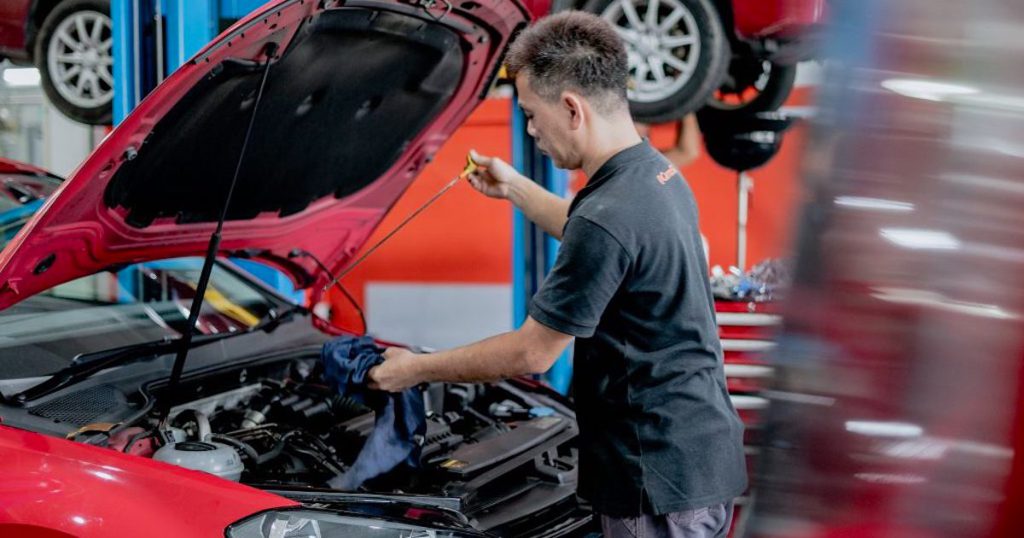Given Singapore’s ageing vehicle population, local automotive workshops have recorded an increase in business over the past few years.
As of July 2022, over 20 per cent of cars in Singapore have been in use for nine or more years. There has also been an increase in people who have chosen to renew their Certificate of Entitlement (COE) on decade-old cars. This figure has risen from 7.7 per cent in 2007, to almost 21 per cent in 2022.
That being said, the coming years might not be quite as kind to motor workshops. Although people are holding onto their old vehicles for now, the fleet will eventually need to change.
Electric vehicles (EVs) appear to be the obvious choice for replacement. Singapore plans to phase out petrol and diesel vehicles by 2040 and as part of this plan, the Ministry of Transport has unveiled a variety of tax rebates to incentivise EV adoption.
In just the first five months of 2022, EVs have accounted for 8.4 per cent of all new car registrations. This is more than a two-fold increase compared to 2021, and a 20-fold jump compared to 2020.
This exponential growth puts motor workshops under pressure to expand their services and cater to an EV clientele.
Maintaining an electric vehicle
EVs have different needs as compared to internal combustion engine vehicles (ICEVs).
Since electric motors have fewer moving parts, they require less maintenance. There’s no need to clean valves, change oil, or replace spark plugs. In fact, automotive manufacturer BYD estimates that the annual costs for maintaining an EV can be as less as half that of ICEVs.
Regular maintenance of EVs primarily revolves around the tires. Since these vehicles tend to be heavier than their petrol and diesel counterparts, their tires tend to wear out faster. According to EV company Recurrent, the lifespan of regular tires could be shortened by up to 20 per cent when installed on an EV.

On the other hand, EVs go a lot easier on the brakes. In fact, their braking systems can last up to twice as long.
Unlike ICEVs, EVs rely on regenerative braking. This involves slowing down a vehicle by converting its kinetic energy into electricity, which can then be used to recharge its batteries. In contrast, ICEVs make use of friction braking, which generates heat and leads to faster wear and tear.
Apart from this, there are components such as the air conditioning and cabin air filters, which are fairly similar between EVs and ICEVs.
EV battery repair
Things get trickier when it comes to the batteries. Since they’re built to last anywhere between 10 and 20 years, batteries don’t require nearly as much maintenance as engines. However, there are cases of defects and malfunctions which must be accounted for.
As it stands, most motor workshops in Singapore aren’t equipped to deal with battery repair. In fact, there are plenty of EV manufacturers which don’t offer these services either.
“Many EV manufacturers currently have only one solution when a battery unit in their cars is defective or malfunctioning — [replace] the entire unit,” explains Porsche Asia Pacific’s Ridhwan Low.
However, replacing an entire battery unit incurs significant costs and also leads to wastage. Companies are forced to recycle or dispose precious materials such as lithium, which are found in very low quantities on the planet.

To avoid this, Porsche has been working on its own battery repair concept, which allows individual cells to be replaced.
Repairing individual components brings about considerable cost efficiencies for EV owners. Individual battery module repair also requires less time to complete, meaning less overall downtime for an EV owner. Finally and crucially, the environmental impact of repairing batteries is also much lower, as there is less wasted material that needs to be recycled.
– Ridhwan Low, Manager Aftersales Qualification, Porsche Asia Pacific
Porsche considers this to be an integral step in incentivising the mass adoption of EVs. For motor workshops, battery repair could be an area to pivot to as well, however, it requires a different skill set than repairing engines.
Overcoming the skill barrier
At the start of the year, Porsche chose Singapore as the site for one of its first high voltage repair hubs. The company is looking to train technicians in its battery repair process.
“As Porsche looks to decentralise high-voltage training to eight training locations worldwide, Singapore was chosen for its ideal location in the Asia Pacific region,” he adds.
The company is taking note of the increasing rate of EV adoption and equipping its aftersales team with the necessary skills to maintain premium levels of care.
It’s like open heart surgery, except on a car, with high-voltage safety precautions in place. Needless to say, this type of repair work requires an extremely high level of precision and training.
Porsche Asia Pacific is proud to have three High Voltage Experts in its Aftersales team, and looks to continue elevating High Voltage Technician training programmes in this region.
– Ridhwan Low, Manager Aftersales Qualification, Porsche Asia Pacific

Recently, the company also signed a memorandum of understanding (MOU) with the Land Transport Authority (LTA) to standardise and train technicians in EV servicing in Singapore. Porsche offers three levels of qualifications, with training administered through classroom- and web-based learning.
“Once all qualifications have been fully met, mechanics are allowed to work on the respective vehicle repair levels. To maintain a high level of knowledge retention, Porsche High-Voltage technicians must carry out at least one repair a year to maintain their qualification level,” explained Low.
This MOU also includes 20 other organisations — automotive companies, vehicle fleet owners, and government agencies — which are taking on the responsibility to train automotive technicians in EV maintenance.
As the push for sustainable transport continues, it remains to be seen whether Singapore’s motor workshops are up for the challenge.
Also Read: Adapt or die: What will happen to petrol stations once EV adoption is in full swing in S’pore?










